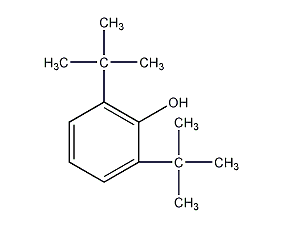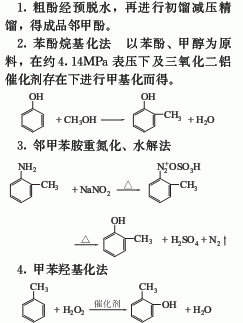
Structural formula
| Business number | 03LH |
|---|---|
| Molecular formula | C14H22O |
| Molecular weight | 206.33 |
| label |
2,6-bis(1,1-dimethylethyl)phenol, 2,6-di-tert-butylphenol, 2,6 ditert-butylphenol, 2,6-Di-tert-butylphenol, 2,6-Di-ter-butanol, 2,6-(1,1-Dimethylethyl)phenol, Aromatic halogen derivatives |
Numbering system
CAS number:128-39-2
MDL number:MFCD00008820
EINECS number:204-884-0
RTECS number:SK8265000
BRN number:1841887
PubChem ID:None
Physical property data
1. Properties: colorless or light yellow flammable liquid.
2. Density (g/mL, 25/4℃): Undetermined
3. Relative vapor density (g/mL, air=1): 1.0336
4. Melting point (ºC): 36.5
5. Boiling point (ºC, normal pressure): 253
6. Refractive index at room temperature (n20): 1.5001
7. Refractive index: 1.5282
8. Flash point (ºC): 581
9. Autoignition point or ignition temperature (ºC ): 559
10. Solubility: Soluble in caustic alkali and commonly used organic solvents.
Toxicological data
1. Acute toxicity: Oral LD5O in mice: 800mg/kg
Intravenous LD5O in mice: 120mg/kg
Rabbit skin LD5O: >10gm/kg
Dolphin pig skin LD5O: >10gm/kg
2. Other multiple dose toxicity: Rat oral TDLO: 19708 mg/kg/3W-C
Mouse oral TDLO: 12480ng/kg/12D-C
Ecological data
None
Molecular structure data
5. Molecular property data:
1. Molar refractive index: 64.90
2. Molar volume (cm3/mol): 221.2
3. Isotonic specific volume (90.2K): 518.3
4. Surface tension (dyne/cm): 30.1
5. Polarizability (10-24cm3): 25.73
Compute chemical data
1. Reference value for hydrophobic parameter calculation (XlogP): None
2. Number of hydrogen bond donors: 1
3. Number of hydrogen bond acceptors: 1
4. Number of rotatable chemical bonds: 2
5. Number of tautomers: 2
6. Topological molecule polar surface area 20.2
7. Number of heavy atoms: 15
8. Surface charge: 0
9. Complexity: 184
10. Number of isotope atoms: 0
11. Determine the number of atomic stereocenters: 0
12. Uncertain number of atomic stereocenters: 0
13. Determine the number of chemical bond stereocenters: 0
14. Number of uncertain chemical bond stereocenters: 0
15. Number of covalent bond units: 1
Properties and stability
Homo-o-cresol. Rat oral LD502020mg/kg. If it splashes on the skin, rinse with water or scrub with alcohol immediately. For protective methods, see o-cresol.
Storage method
Packed in galvanized iron drums, net weight 100kg per drum.
Synthesis method

Purpose
Making raw materials for antioxidant 264 (2,6-di-tert-butyl-p-cresol) and rubber antioxidant. In the plastics industry, phenolic resins and plasticizers can be manufactured. Used medicinally as a disinfectant. In addition, it can also be used as raw material for dyes and pesticides.

 微信扫一扫打赏
微信扫一扫打赏

